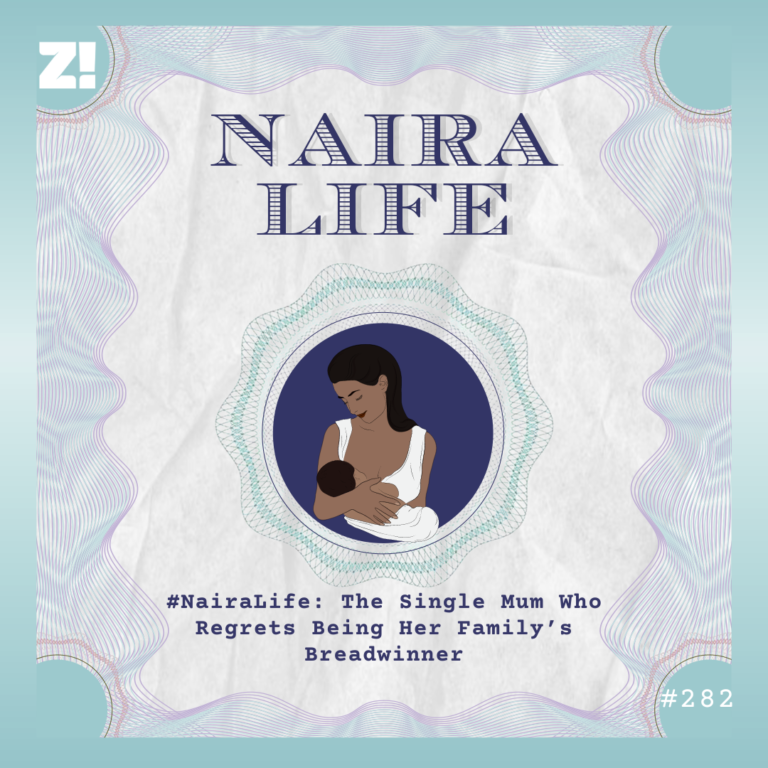Romoke* (32) has been her home’s primary breadwinner since she got married in 2018. At first, she didn’t think much of it, but over the years, she’s come to realise this dynamic isn’t normal.
She shares why she can’t leave and how she’s made it a priority to advise other women not to tow the same path.
As told to Boluwatife

Love can push you to do foolish things. Now, when I get the opportunity to talk to single ladies about relationships, I tell them to shine their eyes. Love won’t feed you; is there money? But the truth is, I didn’t take to advice either.
Let me tell you my story so you know what I mean. My mum was the sole breadwinner when I was growing up. My dad was what you’d call a sperm donor with audacity. He was a mechanic who hardly dropped money at home, but he’d come home at night to demand two pieces of meat in his food. My mum paid rent, school fees and bought clothes for all her four children with the money she made as a fabric trader.
My family’s dynamic didn’t seem strange to me. I never saw or heard my mum complain about providing for almost everything, including my dad’s demands. I grew up in a neighbourhood where most of the mothers had their shops and different hustles to take care of their children. This meant that I didn’t have anything else to compare my mum’s situation to. It was my normal.
As a child, whenever I went to my mum to ask for money to buy something, she’d say, “When you start making money, you’ll know that they don’t just spend money anyhow”. It always confused me. I want to buy sweets, and you’re saying I’m spending money anyhow. It made me start dreaming of making my own money, so I wouldn’t have to answer to anyone.
Of course, I became entrepreneurial early. I’d take my elder sister’s pictures to my secondary school to show my seniors and charge them ₦30 for our home’s landline so they could speak with her. My sister and I used to share the money equally.
There’s almost nothing I’ve not tried to make a business out of — selling recharge cards, writing notes for classmates in uni, braiding hair for my friends in the hostel and during NYSC camp and even selling baby clothes at a nearby primary health centre.
It was during one of my many hustles that I met Dare*, the man who eventually became my husband. It was 2016, and I was selling male clothes and watches on Facebook and WhatsApp, in addition to my 9-5 as an admin officer.
He was a friend on Facebook, but we never interacted before he slid into my DM to ask about a wristwatch I’d posted earlier that day. He wanted to buy it for someone but wanted it delivered to him first. That’s how we discovered that we lived in the same neighbourhood. We got talking and started dating after we met up at his church.
There were warning signs.
Dare didn’t have a job. He spent all his time at church where he served — still does — as the choirmaster. He also went to sing at other churches, and they’d pay him an honorarium. He didn’t tell me how much, but I guessed it was enough to survive on. He also lived with his parents.
We didn’t really talk about money. I didn’t care that he’d ask to borrow ₦10k on random occasions or that we hardly went out on dates. I didn’t depend on guys’ money in my previous relationships, so it wasn’t a big deal.
When I asked Dare about the job thing, he said he was applying but hoping to get something that wouldn’t affect his gospel ministry. Just before we started making wedding plans in 2017, he got a job as a supermarket supervisor. He didn’t tell me his salary, and I didn’t ask. I didn’t think it was my place.
After our parents agreed on a wedding date, we went to visit his pastor to inform him. The man called me aside and asked if I was sure I knew what I was doing. He said, “Dare doesn’t have a proper job. Why not wait a bit?”
I defended my husband-to-be. Sure, I wanted him to get better than the supervisor job, but I was also selling clothes and making good money — at least ₦25k weekly. Together, we could pull resources and build a home. But Dare and I hadn’t actually clarified how money would work in our home. I was too in love to care. In my mind, we’d get married and live happily ever after.
A few weeks after we got married in 2018, Dare quit his supervisor job. They’d refused to permit him to leave work for a week so he could travel to another state for a gospel ministration. So, he chose to leave.
The same scenario played out a couple more times over the first two years of marriage. He’d get a job and then leave after a few months because he was either tired or felt like it interfered with his passion. Did I mention I paid the rent for the house we lived in? In fact, I paid for everything we needed daily. But I still thought I was being a virtuous wife and didn’t harass him to stick to a job.
In 2020, Dare said he wanted to start a business selling musical instruments. He knew I had almost ₦1m in savings and convinced me to give him because we could make double that. So, I gave him. He never started that business.
We also had our first child around the time I gave him all my savings. I was so broke I couldn’t even buy clothes for my baby. After about six months, I began to ask him about the business. I mean, he’d taken all that money and wasn’t even telling me anything. That caused our biggest fight to date. It was like, how dare I have the audacity to question him? His parents came to settle the matter and I had to apologise to him.
RELATED: 6 Women on the Burden of Being Breadwinners in Their Families
I think it was then my eyes started to “clear”. Dare stopped trying to get jobs entirely and would just sit at home watching TV when he wasn’t singing at one church or the other.
I reported him to his pastor several times, and he’d call Dare — without telling him I’d talked — and ask him for updates about his job. Dare just gave excuses and the pastor would in turn tell me to be patient with him and pray. I’m sure the man was thinking, “Shebi I told you?”
We had our second child in 2022, the year I finally admitted to myself that there was nothing normal about our marriage. I listen to sermons and see other couples in our church. The women aren’t the breadwinners. Dare has no intention of earning anything to provide for his family. He has never bought clothes for me and our children. I don’t know if he still gets honorariums from ministering at churches, but I don’t get anything. I still feed him.
I’ve complained about him not dropping money several times, but it always turns into a huge fight, and I end up apologising. Church leaders can do nothing except advise me to be submissive. My pastor’s wife secretly advised me to save money in an account without my husband’s knowledge.
But how much can I save from a clothes business when I still handle all the bills? I can’t let my children starve, right? I’m honestly tired. I now avoid most of my friends at church because how many times will I say I can’t afford aso-ebi or monthly contributions that the married women in church do? Am I even married, in the real sense of the word?
I feel like everyone in church knows our situation — the choirmaster who does nothing but sings while his wife feeds him — but none of them can call him out because they want to keep up the appearances of a godly home. But what kind of home is this?
I didn’t know better when I was younger, but I do now. Even the Bible says the man should provide. I’m a woman, I shouldn’t be the breadwinner. But I can’t leave my marriage — that’s a sin. I can only pray that God will touch Dare’s heart and give him a job that allows him to take his place as the head of the house.
Until then, the most I can do is advise young single ladies. Love won’t feed you.
*Names have been changed for anonymity.
NEXT READ: I’m Tired of Men Wanting to Date Me Out of Pity




